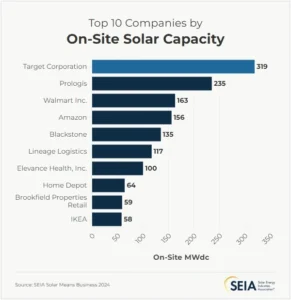Small Business Gets Big Business Solar Benefits
In Massachusetts Solar for Small Business is Big
Solar industry organizations have been monitoring corporate solar buying trends and surveying corporate viewpoints on solar energy for years. One prominent group, the Solar Energy Industries Association (SEIA), produces a summary of those results each year in a report titled “Solar Means Business.” Per the SEIA, this report tracks solar and energy storage adoption by businesses across the U.S., ranging from some of the country’s largest and most recognizable brands to the small businesses that make up our communities.
While the corporations that install the most solar have nationally focused teams and often work through project development consultants, the benefits gained from going solar are no different than those for every small or local business making a similar investment. For large corporations, sustainability programs which include clean energy adoption are large in scale, involving multiple sites, and are planned across years. Yet, the justifications for each location are the same.
We think that the speed to getting results and the opportunity to maximize savings for small, local business is better than big corporations enjoy. Here’s the case:
On-Site and Rooftop Solar Energy
Adding solar to buildings owned by the company is the preferred option for many of the largest retailers and sellers.
Some of the largest corporate adopters of solar energy and clean energy have very high energy needs requiring a mix of contracted purchases from utility scale solar along with local on-site installations. For example, SEIA shows the Top 10 companies based on capacity installed on-site include big box retailers with a lot of brick-and-mortar rooftop area available. Target, Walmart, and Home Depot are examples of businesses with high volume and lower margins which are seeking savings from installing significant amounts of solar energy.
Companies like Meta and Google, which continue to rank near the top in total clean energy purchases, must include contracted arrangements with third parties that build the capacity offsite and resell the power to the company. These are typically Power Purchase Agreements (PPA) which provide a level of savings that is acceptable, although less than locally installed rooftop solar as a rule. Such arrangements reflect that lack of company-owned facilities to be able to offset total energy demand.
Brand and Business Reputation with Solar Energy
Sustainability initiatives are a response to corporate decisions for reducing emissions and a company’s carbon footprint. Often, these decisions are driven partly by public perception and expectations from buyers of the products and services.
As sustainability investments grow, corporations are obligated to communicate and publicize their priorities and their spending to make the largest portion of the public aware. Continuing with Target as an example, the Target Forward campaign was established to announce, track, and update all of the company’s associated sustainability efforts. Included with Target’s direct actions and investments is the tracking of their suppliers’ efforts towards the same sustainability goals. According to their policy, the company goal is to have 80% of their supplier purchases to meet the emissions goals.
Small and Local Business in Massachusetts
As you can see, large business sustainability programs require large scale activity. While the scale may give some purchase power benefits, the other associated costs of in-house planning and support teams and steady publicity required tend to offset many of those related savings.
For small or local business in Massachusetts and the South Coast, the case for going solar is just as strong if not stronger. Here’s our comparison:
At Cabral Solar, we are always operating with a “customer first” approach. In every stage of the EPC project process, we communicate the essential progress to each client and consult and advise whenever key decisions are needed.

